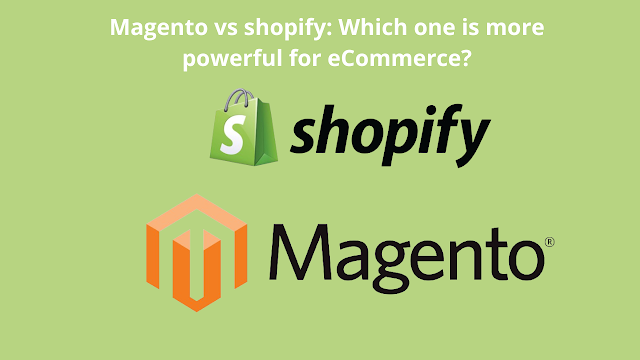- Get link
- X
- Other Apps
Choosing between Magento and Shopify depends on your specific business needs, technical expertise, and scalability requirements. Here's a comparison to help you decide which platform might be more powerful for your e-commerce business:
Magento:
Customization and Flexibility:
- Strengths: Magento offers extensive customization options and flexibility, making it suitable for large-scale enterprises and businesses with complex e-commerce needs.
- Open-Source Platform: Magento Open Source (formerly Magento Community Edition) provides full access to source code, allowing deep customization and control over store functionality.
Scalability:
- Suitability: Magento is highly scalable and can handle large product catalogs, high traffic volumes, and complex operations. It's suitable for businesses planning substantial growth.
Technical Expertise:
- Requirements: Magento requires technical expertise for setup, customization, and ongoing maintenance. Development skills or a dedicated developer team are often necessary.
Cost:
- Initial Investment: Magento Open Source is free to use, but costs associated with hosting, development, and third-party extensions can be higher compared to Shopify.
- Extensions: Many extensions and themes for Magento are available, both free and paid, offering additional functionality and customization options.
Community and Support:
- Community: Magento has a large and active community of developers, users, and agencies, providing resources, forums, and support.
- Enterprise Support: Magento Commerce (formerly Enterprise Edition) offers additional features, support, and services for larger businesses.
Shopify:
Ease of Use:
- User-Friendly: Shopify is known for its ease of use and quick setup, making it accessible for beginners and businesses without extensive technical knowledge.
- Hosted Solution: Shopify handles hosting, security, and technical aspects, allowing businesses to focus on selling products rather than managing infrastructure.
Customization:
- Customization Options: Shopify offers a range of customizable themes and apps to extend functionality. While not as flexible as Magento, Shopify provides sufficient options for most small to medium-sized businesses.
Scalability:
- Suitability: Shopify is suitable for businesses of all sizes, including startups and growing enterprises. It can handle medium to large product catalogs and moderate traffic volumes.
Cost:
- Pricing: Shopify operates on a subscription model with monthly fees starting at $29 for Basic Shopify. Additional costs include transaction fees and app expenses, which can add up depending on store needs.
Support and Resources:
- Customer Support: Shopify offers 24/7 customer support via phone, email, and live chat for all subscription plans.
- App Store: Shopify's App Store provides a wide range of apps and integrations to enhance store functionality, marketing, and operations.
Conclusion:
Choose Magento if you need extensive customization, scalability for large product catalogs and high traffic, and have the technical expertise or resources for development.
Choose Shopify if you prefer ease of use, quick setup, and support, and prioritize user-friendly management without extensive technical knowledge.
Ultimately, the decision between Magento and Shopify should align with your specific business goals, budget, scalability needs, and technical capabilities. Both platforms are powerful in their own right, catering to different segments of the e-commerce market.

Comments
Post a Comment